 This entry contains part 2 of an after-dinner speech which I presented at the Kronos World Wide Sales and Service Conference in Chicago, on Friday, May 30, 1997 (to see part 1 ← click here). There were about 800 Kronos personnel in the audience. My image was projected on two 4.25 meter high screens (14 feet), so that people in the back of the room could see me. Written to suit the occasion, this speech contains a good deal more humor than my usual memoirs entry. I've added the photographs; they were not shown at the time of the speech. I've also added footnotes, to clarify items that might not be clear to a non-Kronos audience or with the passage of time. Due to the length of the speech (about 5,300 words, which took about 45 minutes), I've broken it up into two entries. This is the second half of the speech, part 2 of 2. Nowadays, we make our products look high-tech. In the original clock, we did the opposite: we tried to make the product look like an ordinary mechanical timeclock. In 1977, things that looked like computers actually scared people. Isn't that strange? Computers don't scare me. [Spoken slowly and lovingly] Actually, I love to stroke their smooth, cool, beige panels. [Gripping podium, getting very excited] Imagine 32 Megs of RAM, a four gigabyte hard drive, and ... [Speaker stops in mid sentence, pulls out a handkerchief and wipes his brow, and collects himself] Note 1
Mark Ain personally went out to find companies willing to be beta test sites. He placed a clock at Monroe-Narcus, a local printing shop. Kronos employee Gary Ring used to hang out near the clock, to report on how real-world production workers were reacting to it. One of Gary's detailed reports included, verbatim, the following exchange, "Hey, Joe, you can't punch out, there ain't no card here that says asshole! [sarcastic laughter]." We figured that if the workers were reacting to the clock with a sense of humor, we were home free. In the Kronos spirit of nepotism, Mark's brother Aron shortly joined the company. Aron was a lean and hungry salesman in those days. Well, anyway, he certainly was a lot leaner than he is now. He strode into the office, tripped over the carpet, and got right to work. We all did everything back then. Heck, I tried to trim the fibers around the hole in the carpet, but new ones kept popping up. Aron or Doug Nicholls would personally fly out, install clocks, and train the customers, when we had enough sales to cover the airfare. Aron even worked in the shipping department. We made the clocks on the third floor, and Aron carried them to the first floor for final test and shipment, where many of the freshly manufactured clocks failed the final test. The engineers insisted that the clocks had worked fine when they left the third floor, and accused Aron of "carrying them wrong." That's when Aron first learned how creative engineers can be, at least when they're making excuses. Steve Hiatt reminded me of that episode.
Aron even made service calls. He made an emergency trip to a customer in Chicago for our first "customer down" service call. The customer had given us the sort of highly descriptive trouble report that we've since come to know and love, "It won't read cards". After taking the whole clock apart, he removed a dime from the card slot. After that, the card guide was redesigned to allow coins to pass through to an aluminum tray, which kept them from falling into the power supply, which would have had really spectacular results. Doug Nicholls reminded me of that last story. Aron opened up our original Chicago office, which was in a former funeral home. Doug was in Chicago with Aron when Kronos interviewed Craig Latto for the first time. Doug told me, QUOTE, "Craig came by the office after hours, and we let him choose the restaurant. It was a hole in the wall storefront Italian place, with low prices and heaping portions -- perfect for our high-rolling expense account. The food was great and Craig made us laugh, so we agreed he must be the right guy." UNQUOTE. Obviously, the wisdom of this sophisticated personnel decision has been borne out in the many years since. Aron now holds badge number 4. Doug Nicholls is number 5, and Craig Latto number 9.
Although I'm still a computer hacker at heart, my years at Kronos have educated me in business techniques. Combining computer hacker and financial methodology, I've now learned to handle my daily hygiene on a quarterly basis. Too bad for you guys that we're eight weeks into the third quarter. But I digress. Selling a clock priced at close to $3000 when mechanical timeclocks cost only a few hundred dollars was no easy task. That's one of the problems with being a pioneer: you have to educate the marketplace. Nobody had ever even heard of an electronic timeclock, and they had to be convinced of its advantages. But always remember, the most important thing in technical sales is honesty. If you can fake that, you've got it made. Mark Ain got a phone call one day, from a caller who started out with, "Hi, I'm Cra...aa...aazy Eddie!" Fortunately, Mark knew that Crazy Eddie used this line in radio ads for his chain of discount electronics stores in New York, and that it wasn't just someone who forgot to take his lithium. Eddie wanted to buy some timeclocks directly from Kronos corporate. Mark told him this was impossible; he'd have to buy from our exclusive dealer in New York, Interboro. Eddie replied grandly, "I don't buy retail, I buy wholesale! I'm Cra...aa...aazy Eddie!" But when Mark insisted, Eddie just said, "Well, it was worth a try," and proceeded to buy a Kronos clock, from Interboro, for each of his stores. He bought a new one every time he opened a new store; I think we ultimately sold him eleven clocks. It was our largest ever volume sale at the time. Note 4
In March of 1982, Pat Decker arrived for his first interview at Kronos, tripped over the carpet, and then ran into programmer Brad Millman in the hall. Brad had long hair, sometimes in a ponytail, and a shaggy beard. Because Pat had heard that Mark had a beard, and dressed casually, Pat extended his hand, and said, "Are you Mark Ain?" Brad answered, "You should be so lucky." Pat once confided to me that an advantage early in his career prior to Kronos was that he always looked a little older and more mature than he actually was. Do you know that even now, he's only 29? I have to be careful what jokes I make about Pat, because he's President now. So, I'd better not mention that incident with the goat. It was Pat who made our first really large sale, to the Marriott corporation. Every employee who worked at Kronos in that era knew exactly how to spell Marriott, M, A, double R, I, O, double T. I also learned to spell Cincinnati, "Jim Kizielewicz", and "Mike Grzegorek", who wins the Zbigniew Brzinski award for gratuitous use of bizarre consonants. Then I learned to spell "Bill Bangtson", and even "Aron", which I earlier had naively believed to have two A's! Note 5 But you should have seen the look of astonishment on the face of Craig Deeb, of Marriott, the day he walked into the old Kronos building. His jaw really dropped as he tripped over the carpet. Pat had evidently managed to convey the image of a much larger, established company to Craig. Craig stuck with us, though, to the tune of 1.5 million dollars. Marriott employees didn't call their clock the "System 70". They called it "The Kronos". They never saw anything other than a System 70. One day, I was in a Marriott hotel, wheeling a cart out of a trade show. Along with a System 70, the cart held several much smaller Kronos clocks, like a System 25, and a System 10. A bunch of Marriott employees were quite amused by this. One of them screamed, "Ooh, look at the little Kronos!" Maybe she figured we'd left two System 70s alone in a closet, and they'd given birth to a System 10. But I digress. From day one, Kronos always intended its clocks to communicate with a customer's payroll processing computer, but that was harder than you might think. The early 1980's were the dawn of the personal computer age. The IBM PC had not even been conceived of. Payroll processing was done on million-dollar mainframe computers; largely made by IBM. IBM deliberately made it hard for outsiders to communicate with their mainframes; after all, IBM sold data collection terminals of their own. It may be hard for some here today to appreciate the stranglehold IBM had on the computer business in those days. IBM then was what Microsoft is today. Microsoft is getting into new businesses all the time. I recently rented a car from their new auto-rental division, but it stalled because I had too many windows open at once. I had to pull over to the side of the road, close all the windows, and re-boot it. Note 6
So Kronos greeted the IBM PC with great excitement, because we believed, correctly as it turned out, that it would set a de-facto standard, and legitimize the PC. We immediately ditched the Altos, and switched to the PC. We then confidently strode into the DP Manager's office, and said "You can poll the clock with this communications front end, and see? see? it says "IBM" on it!" And this time, the DP manager replied, "Get that toy computer out of here. I've got a real computer." Yup, when PCs first came out, the professionals thought they were toys. But time was on our side. Over the next two years, the DP manager watched the IBM PC infiltrate his company. They were so cheap that anyone could buy one, outside the DP budget. Engineers bought them. Secretaries bought them. Accounting bought them, and wrote Lotus 1-2-3 spreadsheets to do tasks that had been on the DP backlog for years. So a few years later, there were two kinds of DP managers, those who had accepted the PC, and those who were flipping burgers at McDonald's. Our communications problems were over. The IBM PC changed life at Kronos completely. Before the IBM PC, our most complicated clock was the System 70, with over 80 Kilobytes of Z80 assembly language code in ROM in the clock. 80 Kilobytes sounds absurdly small these days, but in those days, that was a lot of memory. Nowadays, we talk in Megabytes, or even Gigabytes. Gee, with all this talk about bytes, I'm starting to get hungry again. Anyway, after the advent of the PC, Kronos clocks started getting simpler. Mark Ain said to Jack Rich, [echo effect] "put the System 70 into a PC." Jack was the logical choice, because he's a talented programmer, he had worked on the System 70, and he had married the president's sister Alice. I told you Kronos was big on nepotism. Our telephone list started with AIN, ALICE; AIN, ARON; AIN, MARK. And so TKC was born. So help me, that was the complete original spec. for TKC: [echo effect] "put the System 70 into a PC." Jack Rich is employee number 6. There was one period when they let me out of the office. I spent some time in the late eighties trying to improve our field service procedures. Boy, getting out into the field is a real eye-opener! It's dangerous out there! Well, I guess you folks know that. We've had at least one clock shot to death; another was smashed off the wall by a passing fork lift truck. At the Oscar Mayer Louis Rich turkey processing plant in Tulari, California, they wanted to wash the clocks down every day. That was an interesting visit; a huge plant with live turkeys going in one end, and cold cuts coming out the other. In Kronos terminology, the turkeys punched IN, but they never punched OUT. A cousin of mine who lived in the area nicknamed it, "The House of Turkey Death." It wasn't a great environment for the timeclocks, either, although as far as I know, none of them ended up in a sandwich. I'm not sure we can account for all the service people we sent out there, though. Then there was the infamous Datasaver, a device which could be hot-plugged into a powered-up clock to save the contents of its memory. The Datasaver was the Kronos version of Russian Roulette. Plugging in a Datasaver was a little like getting rear-ended in a Pinto; you might be uneventfully protected by the rear bumper, or you might be incinerated in a spectacular fireball. Once, on a service call, we used the Datasaver to save the clock's memory while we worked on it. Upon reloading, the dreaded "Call Service" indicator on the clock's panel was flashing, meaning impending doom. But it was really late, and there wasn't anything we could do about it. The experienced service rep. I was with didn't want the customer to know that we had messed up the clock, so he unscrewed the keyboard assembly, and stuck a small piece of black electrical tape over the "Call Service" LED. He then re-assembled the clock, and, voilà, the "Call Service" indicator wasn't flashing any more! I forget who taught me this technique, but I suspect that he's since made a fortune helping people to get the 12 : 0 0 to stop flashing on their VCR's. Note 7 See, I was involved in a lot of major discoveries; I'm sort of the Forrest Gump of Kronos. Nowadays, things have gotten enormously complicated. The PC made things simpler at first, but then they started getting more and more complicated again. Now we have to deal with UNIX ports, LANs, WANs, multi-tier client/server architecture, the web, and so on. It boggles the mind to try to understand it all. Sometimes the main difference between a Kronos salesperson and a used car salesman is that the used car salesman knows when he's lying. Just kidding; I'm sure everyone here understands all our products in full detail. Now, more than ever, it's becoming important for Kronos employees to have a world-wide outlook. So everyone, after you've studied our next 17 product releases, and mastered three-tier Client/Server architecture, learn French and Spanish. How hard can it be, anyway? They're both Romance languages. Look at a sample word: English, taxi, Spanish, taxi, French, taxi. Piece of cake. As for the future, I wonder what developments lie in store for us? Already, Tom Champine is working diligently to be sure that our products crash reliably in the year 2000, just as, when we shipped our first clock in November 1979, we tested diligently to be sure we wouldn't suffer a major embarrassment on February 29, 1980. Biometrics is a hot topic: making Kronos terminals recognize fingerprints, or hand prints, or faces, or voices. I hear voices myself, from time to time. But "plus ça change, plus c'est la même chose!": We've been asked about Fingerprint recognition since the day of our first sales call! Mark Ain dealt with this objection using a well-tested sales technique: he lied. He said, "Oh, we can verify fingerprints, but that would add twelve thousand dollars to the cost of the clock." The customer invariably replied, "Uh, never mind", and never brought up that objection again. Of course, in 1979, we in fact had no capability whatever of doing fingerprint recognition. Well, my speech is half over, and we've already gotten to 1989! No, sorry to scare you, in fact, we've had enough history for one evening. I could go on, but I see that the man with the tranquilizer dart gun is here. I've recounted this history because, as George Santayana said, "Those who cannot remember the past are condemned to repeat it." So I imagine that right now you're asking yourselves some deep questions. You're asking yourselves, "What has gotten Kronos to where it is today?" You're wondering, "Why is it impossible to get a good plumber on weekends?" You're asking yourselves, "Will this guy ever shut up?" Virgil once said -- I mean, I wasn't there personally, but he wrote it down -- he said, "Non omnia possumus omnes". Now, that could be very useful to us, if we had any idea what it meant. Note 8 But I can answer your first question, anyway: You are what got Kronos to where it is today. True, our job in Engineering would be a lot easier if you guys didn't actually go out and sell the stuff, and then be picky enough to expect it to actually work, but our enjoyment would be diminished by the lack of a paycheck. So, I thank you for all that you have done for the growth and success of Kronos, and I thank you for the privilege of addressing you this evening. I don't deserve this honor, but as George Burns once said, "I've also got arthritis, and I don't deserve that either." To quote that master of English expression, Dan Quayle, "I stand by all the misstatements that I've made". And I think that giving this speech has increased my stature within Kronos, because I'm sure that at this moment, everyone is thinking, "He's not such a short speaker after all!" Thank you.   Note 1: As you can guess from the text, 32 Megs of RAM and a four gigabyte hard drive were very big back in 1997. Hard to imagine now, isn't it? [return to text] Note 2: America Online ("AOL") used to promote itself as an Internet Service Provider by sending out free floppy discs containing its software, to be installed on your home computer. These days this is generally not necessary, as any software you need to install locally can simply be downloaded from the internet. But in 1997, there were still a lot of people with slow dial-up connections. Besides, many people installing AOL software for the first time were not yet able to access the internet - that's why they were installing the AOL software in the first place. AOL used to distribute their discs in many ways. You would get them in the mail, along with other software you bought, and they would fall out of magazines. You couldn't avoid them; hence my joke. [return to text] Note 3: I massively underestimated this one. There was never a one-inch floppy disk, of course. But in 2010, an SD non-volatile memory card with an area of 1.172 square inches can store 32 gigabytes (32,000 Megabytes). These cards are only 2.4 X 3.2 cm in size (15/16 X 1.25 inches). In October of 1995, the football player Orenthal James Simpson (known as "O.J.") was acquited in the murder of his wife Nicole Brown Simpson and Ronald Goldman, in a case widely thought to be a miscarriage of justice. By the time of my speech in 1997, quite a few books on the case had come out. [return to text] Note 4: Crazy Eddie's actual name was Eddie Antar. In 1990, years after he started buying Kronos timeclocks, he was charged with securities fraud, and fled to Israel under an assumed name. But in June of 1992, he was arrested near Tel Aviv, and subsequently extradited to the US to stand trial. [return to text] Note 5: Who are all these people? "Jim Kizielewicz" and "Mike Grzegorek" were Kronos employees. Everyone called the former "Kizzy", but I thought that we all owe it to our fellow employees to learn to pronounce their names properly, and I did. "Zbigniew Brzinski" had previously served as United States National Security Advisor to President Jimmy Carter. Although the name "Aaron" is usually spelled with two A's, Aron Ain (now in 2010 the president of Kronos) spells his name with only one A. But the most confusing name of all the people associated with Kronos belonged, I think, to Bill Bangtson, one of the co-owners of one of our distributors, BanKoe (the other owner was Bill Koenig). Scandinavians traditionally didn't have fixed family names, but people were instead identified by their father's name. Thus if Lars had a son named Nils, the son would be called Nils Larson ("Nils, son of Lars"). His son in turn might be called Hans Nilson, and his son Bangt Hanson. Note that "Bangt" was a first name. At some point when the family name system was adopted, these "son-of" names got frozen into fixed family names. Hence the family name "Bangtson", which originally meant "son of Bangt". But I found that about 98% of Americans simply couldn't deal with that name. Instead, they almost invariably converted it in speech to "Bangston". This interchanging of the t and the s was no doubt influenced by the large number of names that do in fact end in "ton", which is short for "town". Hence "Kingston" ("King's Town"), "Brighton" ("Bright Town"), "Littleton" (Duh, "Little Town"), and so on. It was rare to hear anyone pronounce Bill Bangtson's name properly (BANGT-son). [return to text] Note 6: The early versions of the Microsoft personal-computer operating system "Windows", which ran on top of the old DOS operationg system, were very buggy. They used to crash all the time, particularly if the user opened a lot of windows (that is, ran a large number of programs simultaneously). A "crash" required the computer to be "rebooted" - that is, restarted. Hence the joke about the car. [return to text] Note 7: Do I have readers who already don't know what a "VCR" is? It's a Video Casette Recorder, an analog recorder that recorded low-definition video on a wide magnetic tape. VCR's all had digital clocks on their front panel, and could be programmed to record television broadcasts at set times. But the commands needed to program the devices were often rather obscure. In fact, it seemed that about ninety percent of the populace wasn't even capable of properly setting the clock. When not set, most of these clocks displayed "12:00", which blinked annoyingly. [return to text] Note 8: After the speech several people asked me what "Non omnia possumus omnes" actually meant. It means, "Not everyone can do everything." I picked it just to have a short not very well-known Latin saying. [return to text]  |
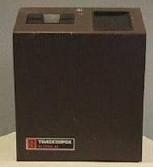 But I digress. We even hid the keyboard under a dark red cover, so it was invisible until it was back-lit. The keyboard was silk-screened right in the Kronos facility by Joe LeLievre, who is here tonight. He is employee number 2. Mark Ain is employee number 1, and I am employee number 3. Joe personally cured the silver-based ink we used in the keyboard, in a convection oven that we bought across the street at Caldor's department store. Boy, talk about high-tech equipment!
But I digress. We even hid the keyboard under a dark red cover, so it was invisible until it was back-lit. The keyboard was silk-screened right in the Kronos facility by Joe LeLievre, who is here tonight. He is employee number 2. Mark Ain is employee number 1, and I am employee number 3. Joe personally cured the silver-based ink we used in the keyboard, in a convection oven that we bought across the street at Caldor's department store. Boy, talk about high-tech equipment!
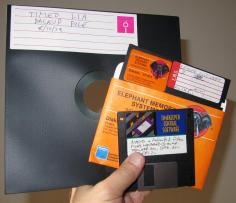
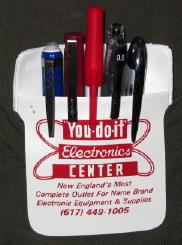 I used to charge around the Kronos facility with my head down, thinking about something, or talking to myself. The problem with talking to yourself is that you know what you're going to say half the time. I often didn't even notice people I passed. Every time I passed Aron's open door, he would call out, "Hey, Lar!" I was usually several yards past the door before this penetrated my brain. I would then turn around, walk back to the door, and say, "Hi, Aron". In all the years Aron did this, it never dawned on me to pre-empt him by stopping at his door and saying "Hello" first. Hell, I'm a programmer! You can't socialize us! They took away my pocket protector when they sent me out here. But I fooled them; [put pocket protector full of pens and pencils into pocket] I've got lots of pocket protectors!
I used to charge around the Kronos facility with my head down, thinking about something, or talking to myself. The problem with talking to yourself is that you know what you're going to say half the time. I often didn't even notice people I passed. Every time I passed Aron's open door, he would call out, "Hey, Lar!" I was usually several yards past the door before this penetrated my brain. I would then turn around, walk back to the door, and say, "Hi, Aron". In all the years Aron did this, it never dawned on me to pre-empt him by stopping at his door and saying "Hello" first. Hell, I'm a programmer! You can't socialize us! They took away my pocket protector when they sent me out here. But I fooled them; [put pocket protector full of pens and pencils into pocket] I've got lots of pocket protectors!
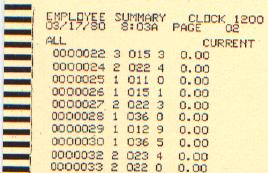 The sale to Crazy Eddie was interesting, in that many of his outlets had fewer employees than we thought were required to justify a clock, so maybe Eddie really was crazy. But he kept tight control over his empire. He had each of his managers pull a report card from the clock every day, drop it into an envelope, and mail it directly to him. That way, he knew the exact hours everyone was working, who came in late, and so on. The early clocks were standalone; remember, there was no PC in those days. You got a report by sticking in a blank "report card", and then gently pulling up on it as the clock printed the report line by line.
The sale to Crazy Eddie was interesting, in that many of his outlets had fewer employees than we thought were required to justify a clock, so maybe Eddie really was crazy. But he kept tight control over his empire. He had each of his managers pull a report card from the clock every day, drop it into an envelope, and mail it directly to him. That way, he knew the exact hours everyone was working, who came in late, and so on. The early clocks were standalone; remember, there was no PC in those days. You got a report by sticking in a blank "report card", and then gently pulling up on it as the clock printed the report line by line.
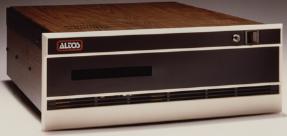 But I digress. To try to get around IBM's blockade, Kronos programmed an early microcomputer to poll our clocks. It was an Altos, running the CP/M operating system. We'd walk into a Data Processing manager's office, and say enthusiastically, "You can poll the clock with this communications front end", pointing to the Altos. The DP manager would look down at the Altos as if it were un tas de merde, pardon my French, a piece of, shall we say, excrement, and he'd reply, "Get that toy computer out of here. I've got a real computer."
But I digress. To try to get around IBM's blockade, Kronos programmed an early microcomputer to poll our clocks. It was an Altos, running the CP/M operating system. We'd walk into a Data Processing manager's office, and say enthusiastically, "You can poll the clock with this communications front end", pointing to the Altos. The DP manager would look down at the Altos as if it were un tas de merde, pardon my French, a piece of, shall we say, excrement, and he'd reply, "Get that toy computer out of here. I've got a real computer."